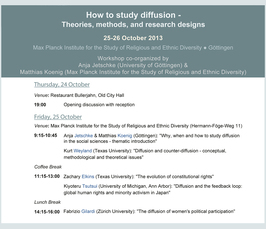"How to study diffusion - Theories, methods, and research designs"
Workshops, conferences 2013
- Start: Oct 25, 2013
- End: Oct 26, 2013
- Location: MPI-MMG, Hermann-Föge-Weg 11, Göttingen
- Room: Library Hall

For more details please contact esser(at)mmg.mpg.de.
The study of diffusion has gained increased attention in both political science and sociology. Comparative scholars in both disciplines have re-discovered the problem of unit interdependence first raised by Galton in response to Tylor’s evolutionary anthropology in the late 19th century (for review of the anthropological literature see Strauss/Orans 1975). Galton’s problem has indeed become pervasive under conditions of globalization in the late 20th century. A prominent line of research has attempted to turn Galton’s problem into an asset by studying processes of diffusion up-front, whether across civilizations, nation-states, organizations, or individuals (Braun/Gilardi 2006; Hendrix 1997; Jahn 2006; Korotayev 2003). There is now a well-established literature in both political science and sociology that identifies different, e.g. coercive, normative, or cognitive mechanisms of diffusion, charts conditions of such diffusion processes, and scrutinizes consequences of diffusion for local practices (for review Elkins/Simmons 2005; Dobbin/Simmons 2007; Holzinger et al. 2007; Meseguer/Gilardi 2009; Weijnert 2002). Scholars have investigated the diffusion of constitutional ideas, legal vocabulary and public policies (Elkins 2000; Elkins et al. 2006; Gilardi et al.; Ginsberg et al. 2008), of social movements and political revolutions (Chabot/Duyvendak 2002; Gilardi et al.; Beissinger 2007; Brinks/Coppedge 2006; Wejnert 2005), of cultural items such as cricket or sesame street (Kaufman/Petterson 2005; Kay 2012).
However, despite significant advances, the study of diffusion faces a number of yet unresolved theoretical and methodological problems. Qualitative case studies closely tracing processes of diffusion make different assumptions than macro-quantitative studies using spatial or network-based auto-correlation matrices in regression models (Dow et al. 1984) or computer-linguistic studies identifying textual dependence. Moreover, the temporal dimension of diffusion processes which had been crucial in Rogers’ (1962) early work on diffusion of innovations has yet to be incorporated into these varying methodological approaches (Braun/Engelhardt 1998; Fernandez/Lutter 2013).
The proposed workshop therefore aims to bring together leading scholars in the field of diffusion studies to discuss common theoretical, methodological and research design challenges. We ask each presenter to take a diffusion process from their own substantive research and to show how they respond to a number of joint problems: 1.) Does the study of diffusion need to start by observing some convergence or isomorphism across units? 2.) How can we establish that such convergence is due to diffusion processes and not endogenous? 3.) How can we trace different processes and mechanisms of diffusion? 4.) How does the study of diffusion address the problem of de-coupling so widely observed in neo-institutional studies of diffusion? 5.) What are the methodological choices when studying diffusion, i.e. which model specifications are sensible for which research questions? We ask each participant to prepare a 5 pages paper summarizing the main argument, to be circulated by October 15, 2013. The argument should be presented, using additional empirical illustrations if appropriate, in a talk of 20 minutes to allow ample room for discussion.